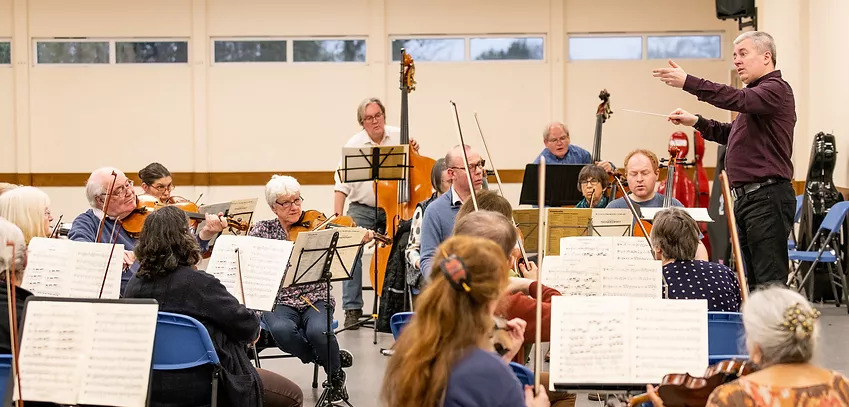The yin and yang of community
Barbara Eifler, CEO of Making Music writes a guest blog for #VillageHallsWeek on the relationship between village halls and music groups.
Perhaps we think of our first disco, birthday parties or scout meetings when someone mentions village halls. Personally, I am immediately transported back to the disastrous opening night of a production of Macbeth during which everything went wrong. It was tremendously enjoyable for the audience (a juicy topic for days), though not for the poor vicar’s wife who had directed it!
But our members will be thinking principally of rehearsals and concerts.
Of the kitchen urn for their tea break, the space at the back to store large instruments, and the piano to accompany the choir – which they must ask Jim to call the tuner for.
They will probably be trying to remember to put their posters on the hall’s noticeboard, to invite the ballet class that uses the room before to perform with them at the next concert, and to approach the over-50s watercolour group to paint them a new banner to use on stage.
Perhaps they are thinking about booking the hall for the next fundraising cake sale which will be another winner, what with the members of the choir baking fabulous cakes, and the music director (the music teacher in the nearby secondary school) bringing along a few bored teenagers to perform some classical piece with him, accompanied by the ever-willing village organist-cum-pianist. Afterwards, those kids will liven up no end when they’re allowed to hit some percussion hard and bellow into a mic whilst looking moody, earning themselves the undying admiration of fellow local teenagers. On that note, Jim is still in two minds whether it was a good idea of the committee to get those amplifiers in for the youngsters when his hearing-aids practically explode!
So, who are these members of ours? And who are we?
We are Making Music, the UK association for leisure-time music, with over 3,800 music groups as our members. Between them, they include around 220,000 hobby musicians.
There are symphony orchestras and community choirs, jazz bands and folk ensembles, ukulele groups, choral societies, drumming circles, glee clubs, saxophone ensembles and Barbershop choruses – and almost any other kind of band you can think of. Many will be rehearsing or performing in your village hall.
About 380 of them are amateur promoters: volunteers bringing professional music performances to their community for all to enjoy without having to drive miles to the nearest city. They will also be hiring your hall.
In common with village halls, our groups are generally run by volunteers who do an amazing job wrestling with unfamiliar responsibilities from health and safety to safeguarding, data protection to funding applications, social media and VAT… And constantly trying to find new volunteers and persuade existing ones not to head for the hills when new red tape appears over the horizon, which they will need to comply with.
But why do they it? Why spend your free hours organising the concert programme or trying to coax the ancient heating system back to life? Why not just go to the pub or sit in front of the telly?
Perhaps because they’re ours: our groups, our halls, our activity, our community. And our personal contribution means there will be a carol concert and there will be a room for the Flamenco class and the gardening talk. That’s why I agree to join a committee and spend evenings worrying about Charity Commission reporting.
Halls and groups are two sides of the same coin: no group would survive with no space locally to rehearse and perform; and there would be no hall without groups to fill it.
Communal living room, doorstep concert hall, wedding venue (aka the village hall) meets brass band, choir, guitar ensemble (aka leisure-time music group) – it’s time to celebrate the essential yin and yang of any community.
Halls and groups are two sides of the same coin: no group would survive with no space locally to rehearse and perform; and there would be no hall without groups to fill it



